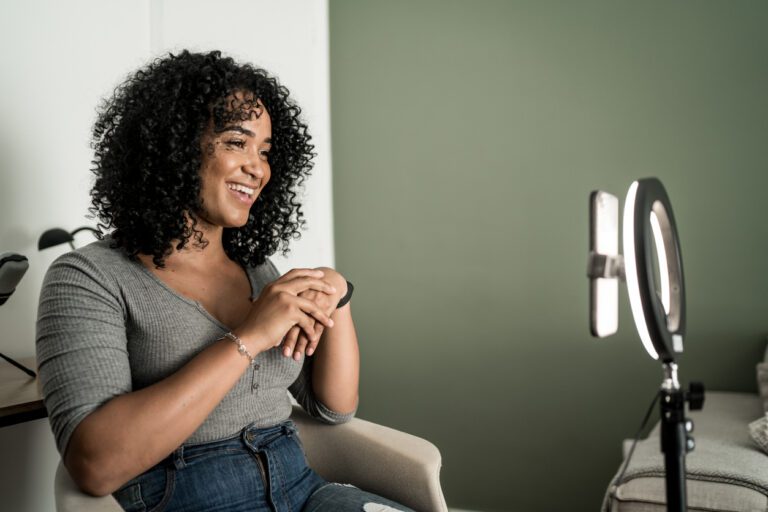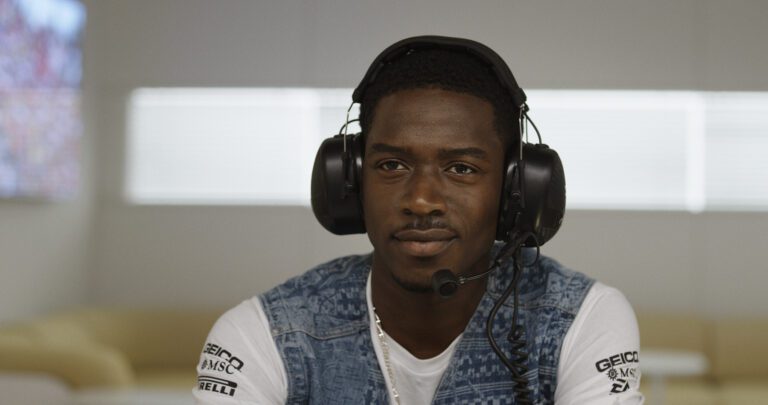Jake Allyn is best known for his role in Amazon Prime Video’s faith-based family drama The Baxters. Beyond acting, he has made his mark as a writer, producer and actor in several indie films, including the western No Man’s Land, where he starred alongside Frank Grillo, George Lopez and Andie MacDowell. The film was directed by his brother, Conor Allyn.
Now the multi-hyphenate adds directing duties to his credits with his current feature film Ride. It stars Forrie J. Smith (Yellowstone), C. Thomas Howell (The Outsiders), Allyn and his Baxters co-star Josh Plasse. Together, they portray three generations of bull riders – the Hawkins family – who need to raise money for the care of the family’s young daughter battling cancer.
Allyn co-wrote the screenplay with Plasse, and the duo play brothers in the film. Ride explores modern cowboy culture and the American rodeo scene, and tackles the issue of addiction in the Heartland. The film is produced by Allyn, his brother Conor and their father Rob Allyn.
Ride has already garnered acclaim, winning the Audience Award for Best Feature at the Dallas International Film Festival and the Bronze Wrangler Award for Theatrical Motion Picture at the Western Heritage Awards. It is now available to watch On Demand.
In a conversation with Casting Networks, Allyn discusses his directorial debut and the process of assembling a talented cast, which also includes Annabeth Gish as Howell’s wife Monica Hawkins, who is also a sheriff.
Was directing always an eventual career plan for you?
I never really saw myself directing until this movie came about. I always saw myself as a writer and an actor. I didn’t want to spread myself thin and be a “Jack of no trades.” My dad was a writer, my older brother is a writer so writing is the foundation of anything I do.
Even on the acting side, a lot of my work starts with writing. I’ve never done an acting role where writing hasn’t been a huge part of the preparation. Writing always leads the way for me, above all else.
How did you decide to take on the directing role for Ride?
It just so happened that as this movie evolved and got set up, I realized I needed to step up and direct to get it made. I never planned to act on a project where I’d be directing for the first time. I wouldn’t suggest it necessarily as the path, but sometimes movies start to make themselves and tell you what they want!
Was there a significant moment that made you realize you should step up as the director?
I got to the point where I was like, “That director doesn’t know as much as I do about (the character of) Monica Hawkins.” When I got on the pitch call with Annabeth Gish, she had some questions about signing on to a movie where it’s a first-time director who’s also playing one of the leads.
I said to her,”My mother’s name is Monica. I love my mother. I got you. No director with more experience is going to care as much about this character as I promise you that I do. No one has thought about it and cried about it as much as I have. I promise you I’ve got this.”
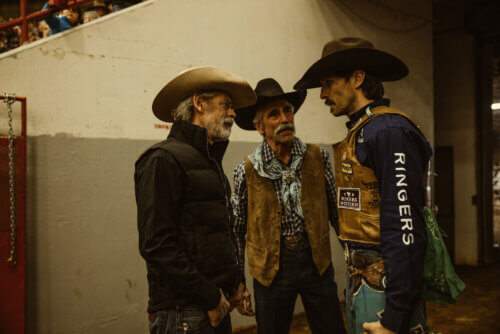 Photo by Fab Fernandez, Courtesy of Well Go USA.
Photo by Fab Fernandez, Courtesy of Well Go USA.Can passion for a project override technical execution from a directing standpoint?
With this movie, I hope my lack of experience behind the camera on a technical side was made up for by my pure passion and love for filmmaking as a whole, and telling a story about rodeo, about this community that I’d grown up around, about cowboys – the good and the bad – and my love for the story itself.
We spent eight years writing and developing it. And especially in the indie game, if you don’t love it, what’s the point?
As a writer and producer, you’ve been involved in the casting process in some capacity already. Was it different when you signed on to be a director?
I’ve been involved in the casting process before, but certainly never in this way. For an indie movie this size, we did a lot of the casting personally, either through contacts that I had, or representatives that took a shine to the script or me.
Forrie J. Smith, for instance, was an offer we made directly to him. I believed he was the right guy for the part. We shot the movie in Tennessee, so we hired an amazing Nashville casting director, Marisa Munoz.
C. Thomas Howell and Annabeth Gish were both popular teen movie stars in the 80s. How did they get on your radar for Ride to married couple John and Monica Hawkins?
With C. Thomas it was two things. I knew he was a cowboy for real. I knew he had done rodeos as a kid and that his dad was a rodeo guy. Since we would be shooting the movie at live rodeos, in live circumstances, we needed to cast people who were comfortable in that world from the start, and I knew he would be.
What was the second thing that drew you to C. Thomas Howell for the role?
I watched C. Thomas in the first season of Animal Kingdom. He played a Navy guy who gets screwed over. He played that part with such a masculine vulnerability. Playing a Navy commander, which you can imagine is a proud position, to see the hurt in his soul, so seeing him play this character feeling hurt instead of getting angry made me think, “That’s John Hawkins.”
Luckily, he took a shine to the script, and me, so we brought him into the evolution of this story. We worked on the script together. There are multiple things in the movie that were a cut-and-paste from his life and his childhood. That was exciting, creatively.
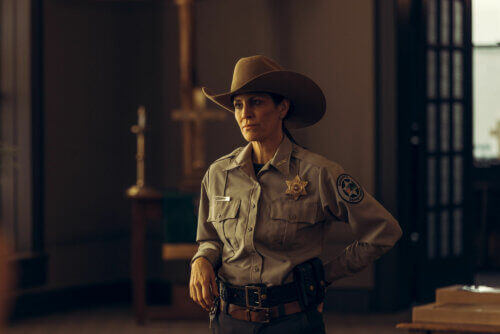 Photo by Fab Fernandez, Courtesy of Well Go USA.
Photo by Fab Fernandez, Courtesy of Well Go USA.How did Annabeth Gish come on board for the film?
I’d seen her play a cop on Sons of Anarchy, so I knew she’d be able to wear the gun and the badge well. In general, watching her on screen, I always felt her strength in all her roles while also bringing that vulnerability. This character had to have that balance of being a strong sheriff who at the end of the day is a mom and a wife. Striking that balance of both at the same time is what she does so well.
What were some specific casting requirements for this film?
We were casting a movie that shot in live situations – almost docu-style. We shot at a live rodeo and working ranches. We shot at a live honky-tonk in West Tennessee that had this rodeo arena in the back. Because of that, we had to find actors who would be comfortable in those types of situations.
If you shoot at a live rodeo, your extras are members of the arena. That also meant we hired a lot of non-actors that were actual cowboys. It just ups the game in terms of authenticity.
What’s an example of a live situation in the movie?
At the beginning of the film, there’s a scene where John (Howell) and his son Noah (Plasse) are opening the feed store early in the morning. I remember placing them in that environment, saying, “This is your sandbox – you can walk here, and you can go there (mimes the perimeters).”
I lined up five cars of people we knew from the actual community who all buy feed regularly. I let them (Howell and Plasse) run the store for 10 to 15 minutes [as I shot] and told them to work in the bits of dialogue from the script as they saw fit.
As an actor who’s had to audition plenty of times in his career, did you feel more empathetic towards those who were coming in to read for you?
I hope that as an actor, I put auditioning actors in a position to win. I strived to be nice and welcoming. Things like, “How are you doing? Were you able to read the script?”
A little bit of kindness goes so far for actors, at least for me. Providing a script and providing a little more context than is usually given goes a long, long way.
Is there something you think actors should understand now that you’ve been on the other side of the casting process?
If you don’t get a part and don’t understand why because you felt you nailed it, it’s because you don’t know how the director is casting the entire movie. As a director, you’re constantly casting around everybody else. There is so much that comes into play that the actor who’s submitting a self tape could [never] know.
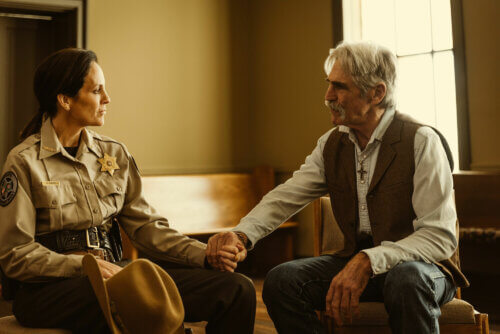 Photo by Fab Fernandez, Courtesy of Well Go USA.
Photo by Fab Fernandez, Courtesy of Well Go USA.What advice do you have for your fellow actors, having now been on that other side of the casting table with the director’s hat on?
The number one thing to know when you’re going into an audition is that there are probably a hundred other things going on with the director. They are almost always going to be in heavy pre-production at the time. All they want you to do is to come in and crush it. They want to offer you the role, so they can check it off their list and not worry about it anymore.
When you’re in a casting session, and your phone’s blowing up because the wardrobe’s falling apart but you have to read 10 more people, you want that next person to walk in and solve your problem of who will play that part. From an actor’s perspective, I know nerves can get the best of you, especially when you’re up for a big show. But that’s something I’ve tried to remind myself about the casting process as an actor: they want you to do well.
Did you know that Casting Networks Premium memberships now include access to health and well-being benefits and discounts? Click here to learn more about Thrive!
You may also like:
- ‘Sacramento’ Casting Director Lindsey Weissmueller Talks Falling in Love with Casting, Why She Doesn’t Stick to One Genre
- ‘Sacramento’ Casting Director Lindsey Weissmueller Talks Falling in Love with Casting, Why She Doesn’t Stick to One Genre
- What’s Casting: Emuaid, Pooof! By Dr. Dorfman, Law Bear, Grüns and More
